How to complete a relegation great-escape by those who have done it
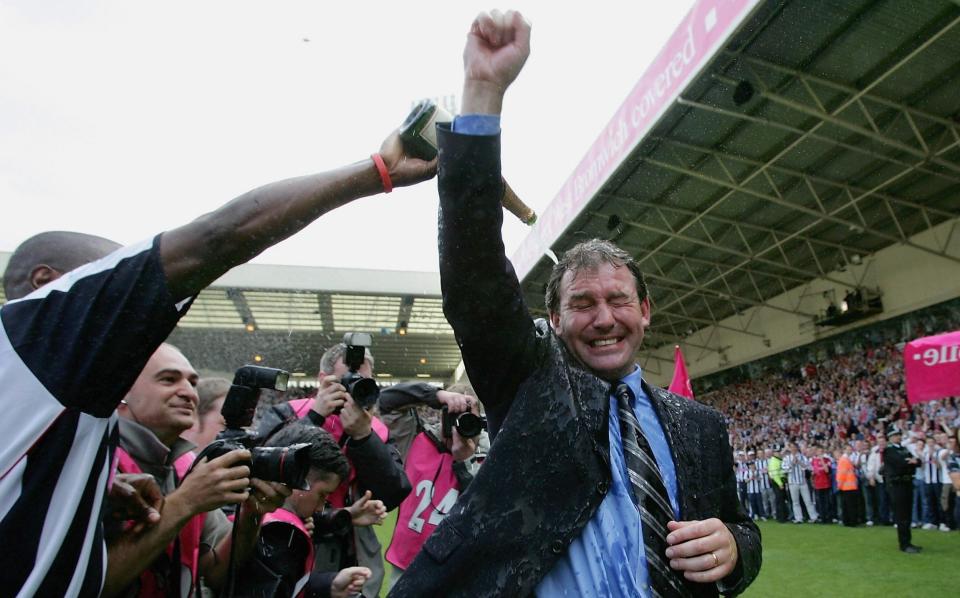
With another tight and fascinating relegation battle in the offing on the final day of the current Premier League season, Telegraph Sport writers look back at some of the great escapes of the last 30 years.
1993: Oldham beat Southampton 4-3 to survive on goal difference
By Mike McGrath
“People might not realise what a great escape it was,” recalls Oldham midfielder Mike Milligan. “We needed to win our last three games, which we didn’t do all season. And it was against Villa, who had to stay in the title race, then the mighty Liverpool and that was before Southampton. I would have loved to have known the odds back then.”
Under manager Joe Royle there was a fighting spirit that proved vital in those last weeks of the season, with Villa beaten 1-0 and Liverpool 3-2.
“They called us Yard Dogs, but we had that determination, belief and team ethic that we had nothing to lose and could show what we were about,” says Milligan. “We had absolutely nothing to lose, playing the hardest two teams first. We went to war in every game and every game was a cup final, so we had that in the locker already. It was about not doing anything silly as we know we could do it after beating Villa and Liverpool. We had been through the hard part to get there. You have to build in your own belief and that is what we did.”
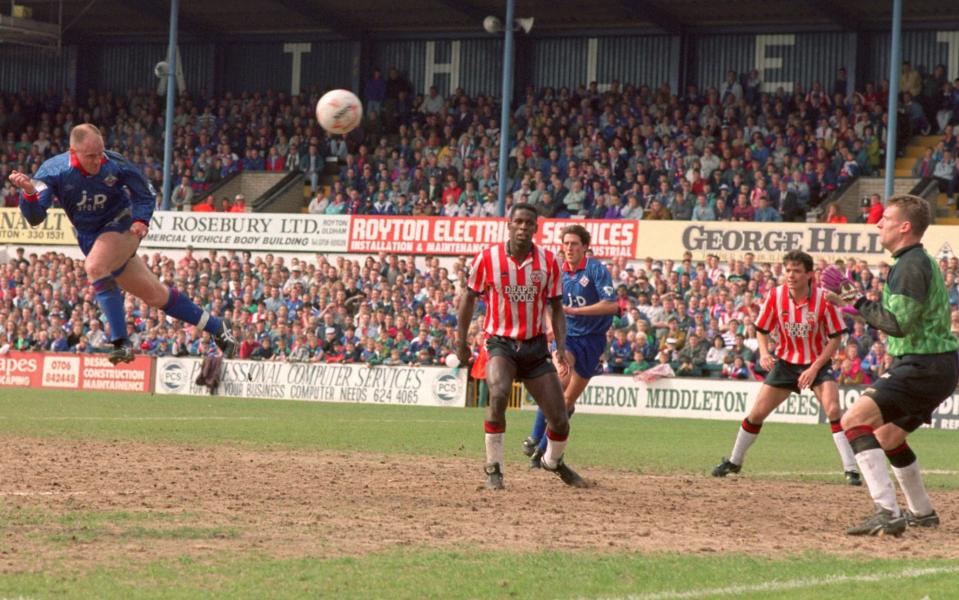
That meant a win against Southampton on the final day would see Oldham safe if Crystal Palace lost at Arsenal, while they duly did. Oldham raced into a 4-1 lead just after the hour mark but two Matt Le Tissier goals left them hanging on.
“In the end, we took our foot off the pedal in the final game when we went ahead and then all Southampton needed was a goal. Talk about nail-biting finish,” Milligan adds.
“I maybe handballed it and if we had Var it could have been a different story. Those are the fine details of football and the ups and downs. We partied for a week afterwards. It was sheer elation. Jubilation and relief. For the fans as well, because it was a case of ‘who’d have thought?’
“You always know an Oldham fan because they have no fingernails. I think the whole of Oldham and Manchester had a party because they [Manchester United] won the title. Everywhere we went everyone was cheering. That was the nice part. I tell my sons about it and they ask how we did it. I tell them ‘only God knows’.
1994: Everton beat Wimbledon 3-2 to stay up by two points
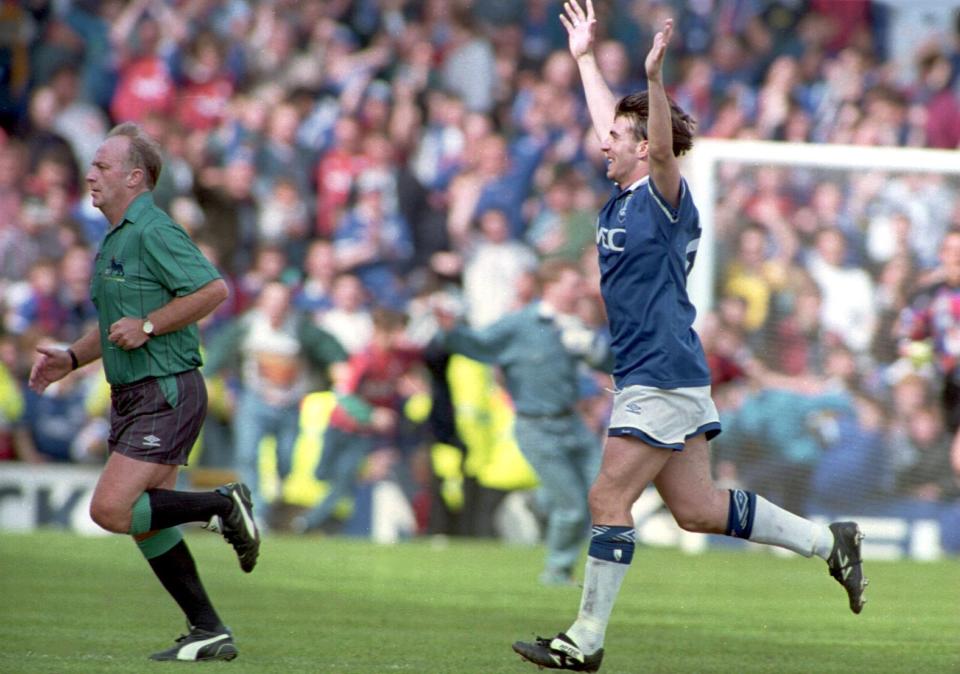
By Chris Bascombe
Perhaps the most famous of all final day escapes came at Goodison Park some 29 years ago. Everton had to beat Wimbledon and hope one of Ipswich, Sheffield United or Southampton dropped points if they were to extend their 40-year stay in the top flight.
“I have experienced the last day drama from the players’ point of view and as a supporter,” recalls Graham Stuart. “Believe me, it is far easier playing than watching. It is so tense. There is so much to lose. Being in a position to be able to do something about it is preferable.
“The build-up to the Wimbledon game is a bit of a blur. We tried to keep the week as normal as it could be, sticking to our routine and not letting the hype and pressure make it more difficult. As the game approached there was a sense of wanting to get it done and dusted.”
Everton’s hopes were nearly done and dusted when they fell 2-0 behind within 20 minutes. Four minutes later, though, Anders Limpar won a penalty and Stuart – under the most immense pressure – sent Hans Segers the wrong way.
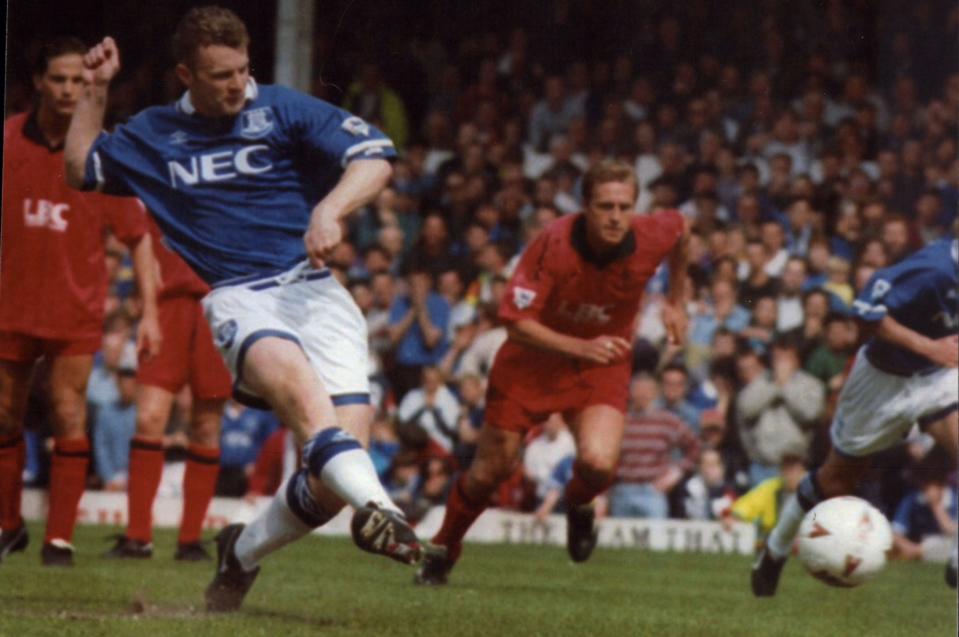
“I knew beforehand I would be taking the penalties, but I never imagined the situation in which one would arise where we were already 2-0 down,” he says. “It could not get any worse.
“What sticks in my mind when the penalty was given was seeing Neville Southall walking towards the halfway line. I was thinking, 'He is mad enough to think he can take this'. Just Nev being Nev. I intercepted him and said, ‘Give us the ball, Nev’.
“As I stepped up, because the Park End of Goodison was being rebuilt, I could see there were kids up the trees to get a view. Every vantage point was taken. You knew how much it meant to everyone. Scoring to get back to 2-1 gave us hope.”
And hope sprang eternal when Barry Horne thundered in an equaliser from fully 30 yards with just over 20 minutes to go. That, though, would not have been enough, but Stuart sent Goodison absolutely wild with a shot that somehow trickled past Segers from outside the area with time running out.
“Barry Horne’s equaliser is the one everyone remembers; a goal for the ages,” says Stuart. “Goodison erupted and we felt the momentum was with us. Hans Segers made a great save from me earlier in the game, but I think of my winning goal as a block tackle into the net!”
🤯 | Experiencing every possible emotion on the final game of the season, #onthisday in 1994... 😓🔵 pic.twitter.com/pRmVN9OtDd
— Everton (@Everton) May 7, 2019
“I had no idea what was going on in the other games. Sheffield United were playing my former club, Chelsea, and we only found out later they lost in the last minute. I have never been one to watch games back, but during lockdown a friend sent me a video of the game from YouTube. You could hear the fear in the crowd every time the ball was near our goal in those last nine minutes.
“At the final whistle it was pure euphoria. Afterwards, the lads had a sense of reality. We were not over celebrating. We were thinking this can’t happen again. It was more relief in the cold light of day. We had quality players who wanted to celebrate winning trophies, not avoiding relegation.
“You look at the side we had and it shows what can happen when you get in a rut in the Premier League. Losing five or six games on the bounce put is in a precarious situation. With respect to Mike Walker [manager at the time], Joe Royle came in soon after and made a big difference without much change in personnel on the pitch. He unleashed Big Dunc [Duncan Ferguson] and we won the FA Cup a year later.”
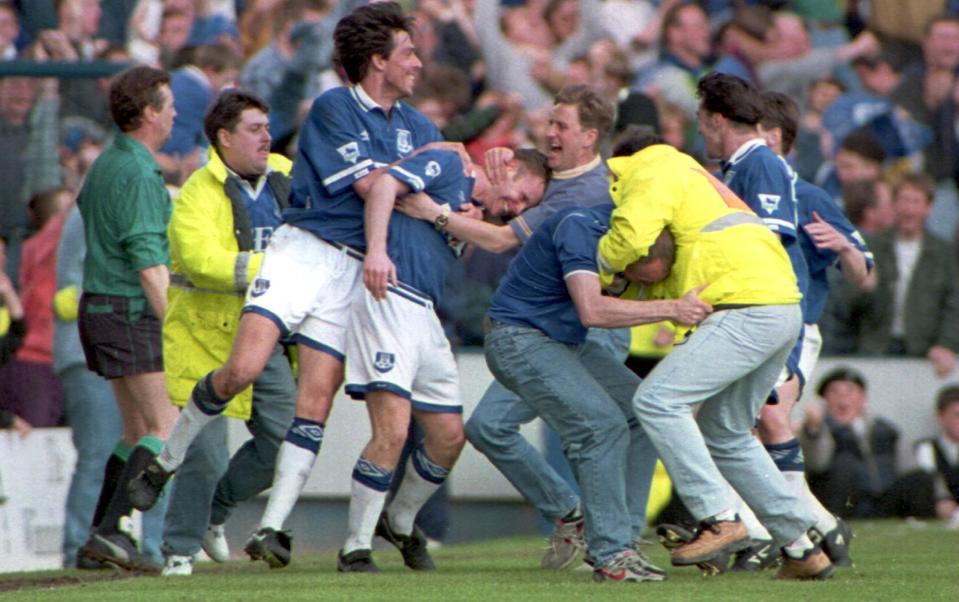
Now Everton have to do it all over again this weekend.
“I will be there on Sunday. My advice to the players is show the fire and passion but make sure you have a calm and clear head. You need to be brave and ultra professional.”
1998: Everton draw 1-1 with Coventry to stay up on goal difference
By Jason Burt
Everton were in 18th place and knew they had to better Bolton Wanderers’ result on the day to survive. They were at home to Coventry City; Bolton, one point ahead of them, were away to Chelsea. In the end Everton drew 1-1 with a late Dion Dublin equaliser leading to a nervy finish. It was enough, though, as Everton stayed up on goal difference as Bolton lost 2-0 and were relegated.
Craig Short was a key part of their defence. “We had gone away to Arsenal the week before and Tony Adams had scored that volley, when he ran through. They hammered us 4-0 to win the title. It was just one-way traffic,” Short explained.
Manager Howard Kendall reacted by switching to a back-three for the final game with Short describing how tense it was in the days before and prior to kick-off.
“The build-up all week was horrific,” he said. “I didn’t want to be a professional footballer. I was not very nice to be with as a family man. Other players might not be honest to admit this but I wouldn’t have been worried if I was not playing. The nerves and the fear of it.
“But we got ourselves into that mess and we were always reminded that Everton had not been relegated [since 1951]. Only two years previously Everton had won the FA Cup, they had finished fifth and qualified for Europe under Joe Royle but then we just had a devastatingly bad season.
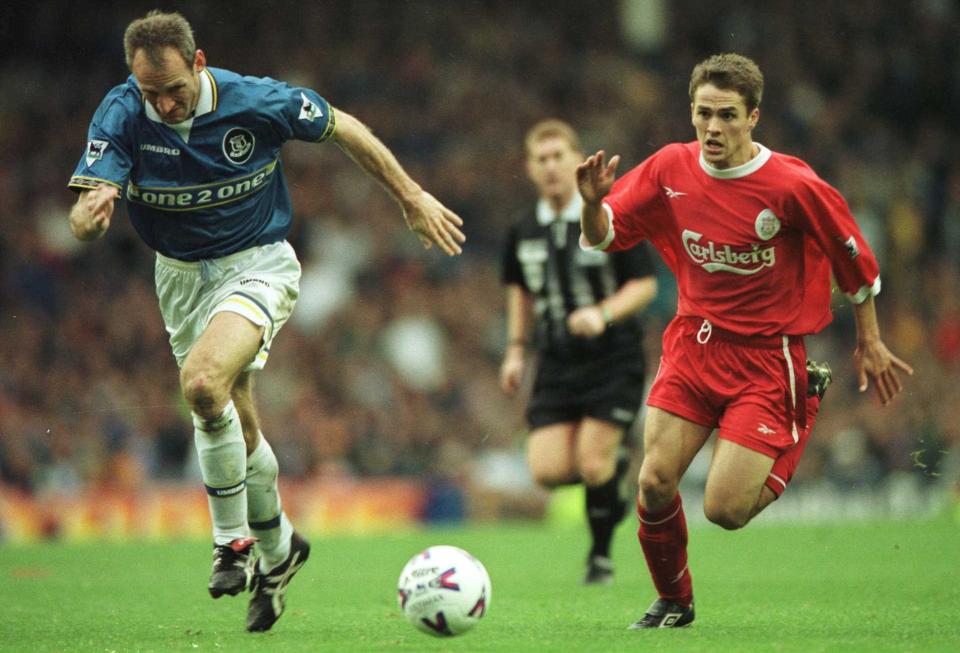
“I remember the warm-up. I looked up to Dave Watson so much as one of the best captains I ever had and a great leader, and I remember asking him how he felt and he just said ‘drained’. When he said that I thought ‘we are in trouble here’. Luckily we stuck together.
“Because we had been hammered the week before we probably didn’t think we could recover. But there was that responsibility for everyone else at the club, the people behind the scenes, Evertonians who had been there for years and it meant so much to them. Players come and go. You might get a cut in your wages but you still have a job.”
Everton went 1-0 up in the first-half through Gareth Farrelly – a rare goal and even rarer as the midfielder struck it with his weaker right-foot – but then Nick Barmby missed a penalty and the tension grew.
“I remember taking two touches after the ball came to me and Dave Watson said to me ‘hey lad, one touch only!’ I had never felt so nervous going into a game,” Short said.
“Then after we missed the penalty they went down the other end and scored. It was just panic after that. It was desperate, desperate times but it was like winning the Champions League when we held on.
“I loved my time at Everton and I absolutely did not want to be associated with taking such a great club down. The scenes at the end… it was just relief. I remember Howard [Kendall, who was then sacked] just crying in the dressing room afterwards.”
It was made all the more dramatic because the players were aware of what was happening at Stamford Bridge. “The fans drove us over the line in the end,” Short said. “They got us through that day. Goodison is an intimidating place to go, the fans are so incredibly passionate and I am sure they will get them through again. It would be devastating to see them go down, it really would.
“We knew Chelsea had scored. You hear the fans and the message came on from the dugout. I was on the far side but Dave Watson told me. It gave us something to hang on to.”
There was a twist however with Short, now 54 and the assistant manager at Oxford United, revealing Bolton should have stayed up anyway.
“If goal-line technology had existed we would have been down as we played them in September, the first game at the Reebok, and it was 0-0,” Short said. “But there was a corner and I was marking Gerry Taggart and he beat me in the air. It hit the crossbar and went over the line by a couple of feet. Terry Phelan was on the post and hooked it clear and it was 'play on'. We got a point and without that we would have been relegated.”
2000: Bradford beat Liverpool 1-0 to stay up by three points
By Mike McGrath
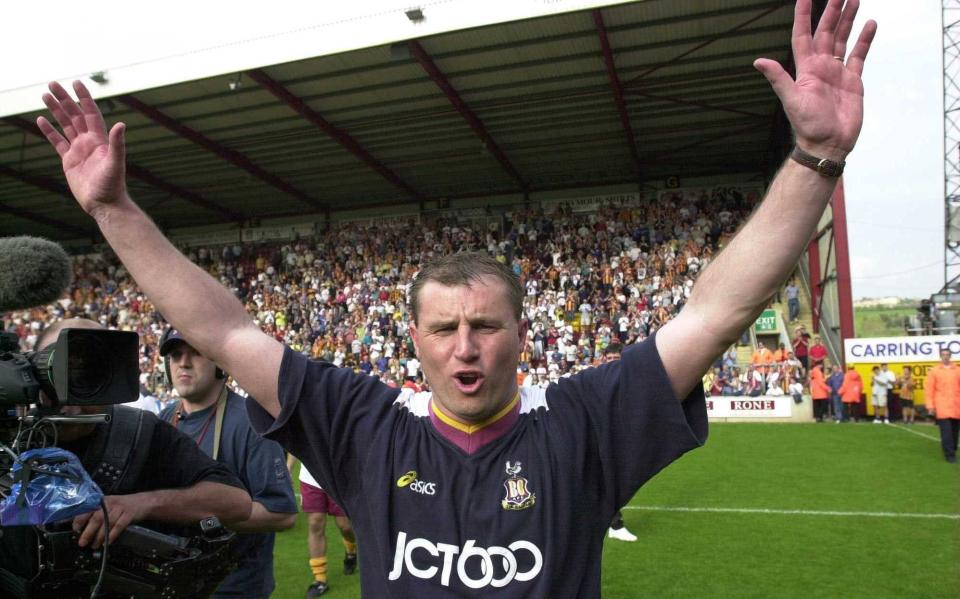
A remarkable run of three wins in four games had seen Bradford roar back into contention having gone over two months without a win from early February. Despite that they still had to beat Liverpool, who were chasing a Champions League spot, and hope Wimbledon failed to win against Southampton.
“It happened to me four or five times in my career where there was something riding on the final game,” explains Paul Jewell, the manager. “With this game, we needed two results to go for us, it wasn’t like when Wigan were at Sheffield United and we knew a win would keep us up. And it wasn’t just about Bradford, as Liverpool were going for the Champions League and needed the win too. It’s not like they were on the beach. They had Steven Gerrard, Jamie Carragher, Emile Heskey, Patrik Berger – it was a proper team and we had to play up-tempo.
“In these do-or-die games, I always thought the week building up to the game was really key. I just got the feeling during the week that the players could do it. Training was bubbly and aggressive but in the right way. Then you put into them that way of thinking that it is one game away.”
“The message is that the Premier League is life-changing and we want to stay in it. Financially for the football club and the players it is life-changing but it is more about desire and wanting to be a Premier League player. We went about them that week trying to be as positive as possible. The game was nervy, as you would expect and I guess the manager can say as much as they want but the players need to believe it themselves. Whatever team it is, if they don’t believe they will not do it. If they do believe, there is no guarantee but it is a start.”
It was a frenetic match which Bradford led from the 12th minute, when David Wetherall escaped some pretty slack marking to head home a free-kick. Southampton went two goals ahead against Wimbledon and the crowd let Bradford’s players know what was going on.
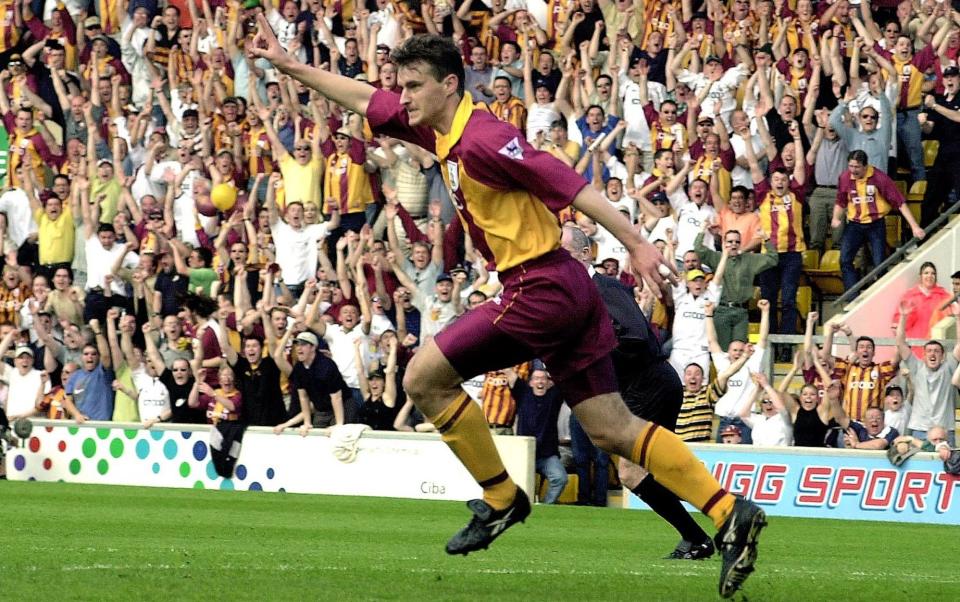
“Among all of it – the hype, atmosphere and pace of the game – the players have to keep their heads,” says Jewell. “ You can’t let heart rule the head. The players will not know that winning might not keep them up but they can’t think that way. You’ll know from the crowd reactions and have to stay focused on your job. Just trying to get players to concentrate on their own game. Every player is involved all the time now, they read newspapers, go online and look at Sky Sports News. There will be something on their game and they have to put that behind them and just concentrate.”
There was a huge pitch invasion at the final whistle but amid the mayhem all Jewell could feel was relief.
“Afterwards, all I wanted to do was go home and sink into my chair. Look, pressure in life is putting food on the table for your family, this is a different pressure. Jobs at the club are on the line. Jobs in the ticket office or the laundry. There are normally redundancies with relegation. You feel the weight of the supporters and hopes and aspirations but also the staff and beyond that because there are repercussions. As great as the Premier League is, it is also a brute. The weight of those expectations will be on the manager.”
2005: West Brom beat Portsmouth 2-0 to survive by a point
By Sam Dean
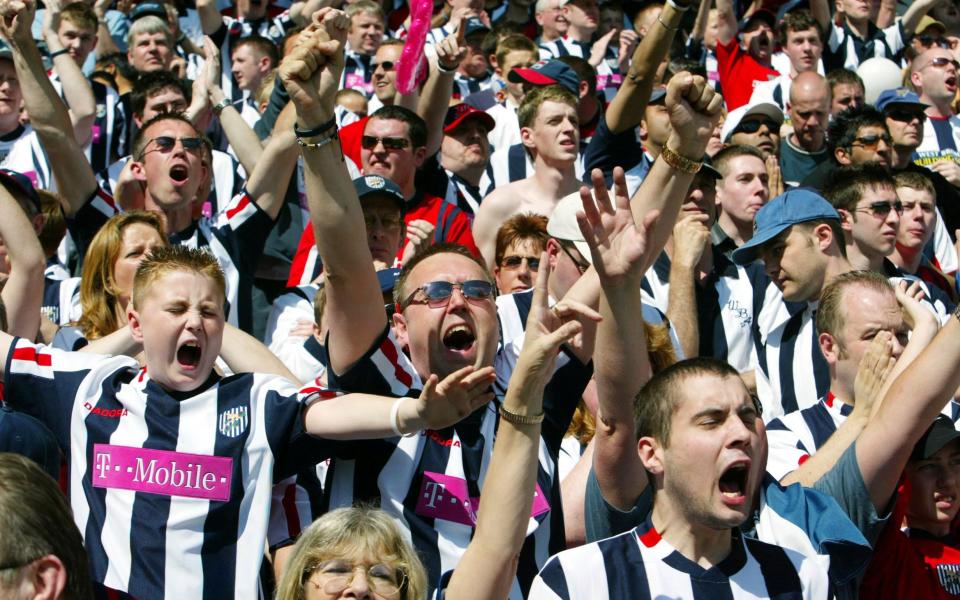
West Bromwich Albion went into the final day of the season knowing that their only route to survival was to defeat Portsmouth and hope all three of their relegation rivals – Norwich City, Southampton and Crystal Palace – failed to win elsewhere.
It was dubbed “survival Sunday” and, as West Brom somehow emerged victorious in the four-way battle to avoid the drop, it became one of the most thrilling days in the careers of many of their players.
“I remember it like it was yesterday,” says defender Paul Robinson. “A surreal day, an amazing day. We knew that all we could do was win our game. We could not rely on anyone else and we were just hoping the results went our way.”
West Brom, who became the first Premier League team to survive after being bottom of the table at Christmas, scored twice in the second half, through Geoff Horsfield and Kieran Richardson. But it was only a late goal for Charlton Athletic against Palace that secured their safety.
“We knew there was pressure on us,” says Robinson. “I remember the build-up and the possibility of people behind the scenes having their pay cut, or even losing their jobs.
“It was the crowd that told us about the other results. We were winning 2-0 but we didn’t know what was going on elsewhere. When Palace were winning 2-1, we could sense it on the pitch. The ground went quiet. But when Palace equalised, the place erupted.
“When the whistle went on our game, we still had five minutes of added time. We were just waiting. The crowd, the players, all standing on the touchline. No one knew what was happening, and then the stadium erupted again. Those moments live with you forever.”
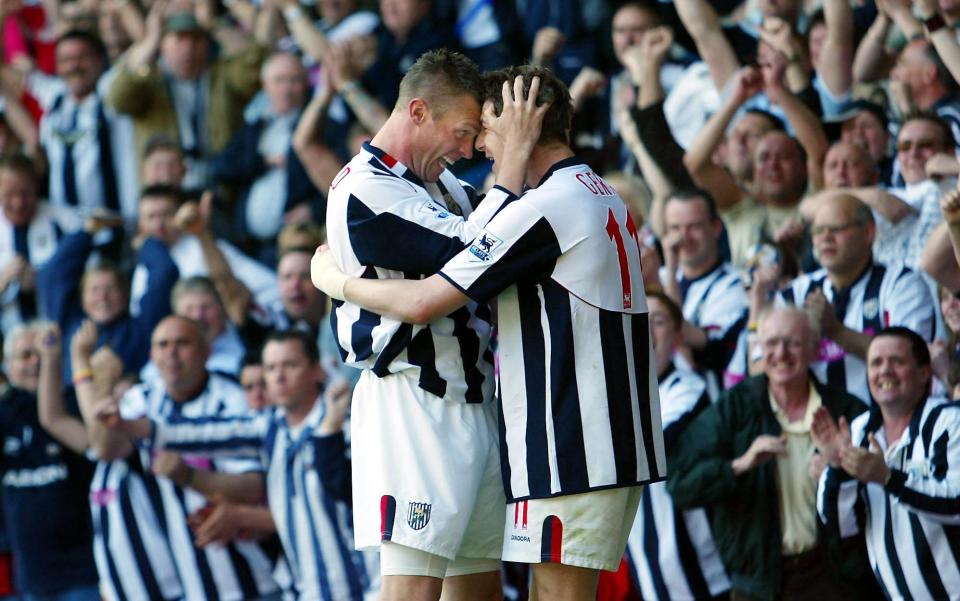
Was there a secret to West Brom’s survival? Robinson points towards a winter break, instigated by manager Bryan Robson, that changed the course of their season.
“Around Christmas time, we knew it was a daunting task,” says Robinson. “We knew we needed to find some solutions. We had a break in the winter, when the manager took us to Florida. We were training, working hard, enjoying each other’s company. When we came back we rolled our sleeves up and gave it a good go.”

 Yahoo Sport
Yahoo Sport 





































